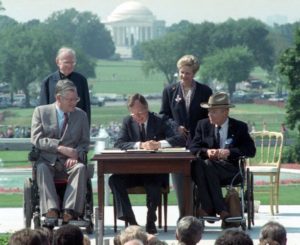December 3, 2018
By Ron Southwick | rsouthwick@pennlive.com
Source: Penn-Live Published December 1, 2018
Over decades of public service, President George H.W. Bush’s work to improve the lives of millions of Americans with disabilities may be one of his more overlooked accomplishments.
But it may be one of the most enduring legacies of Bush’s presidency. And it’s gaining fresh attention in the wake of Bush’s passing. He died Friday at age 94.

On July 26, 1990, Bush signed the Americans with Disabilities Act, a law which has helped millions of people. The law prohibits discrimination against those with disabilities and helps ensure opportunities for employment. According to the Census Bureau, there are about 40 million Americans with disabilities.
“Let the shameful wall of exclusion finally come tumbling down,” Bush said when he signed the law in 1990.
“This historic act is the world’s first comprehensive declaration of equality for people with disabilities — the first,” Bush said when he signed the ADA. He also urged businesses to take advantage of “untapped human potential” by hiring those with disabilities.
In a statement issued Saturday morning, former Pennsylvania Gov. Tom Ridge said Bush’s “deft political touch resulted in civil rights legislation that forever changed the lives of millions of Americans with disabilities.”
In 2015, Bush spoke with Ridge to commemorate the 25th anniversary of the ADA. Ridge, the former homeland security director, serves as chairman of the National Organization on Disability. Ridge also served in Congress while Bush was president.
In the conversation, Ridge noted that many have called the ADA “the most extensive piece of civil rights legislation in American history.”
Bush told Ridge that signing the Americans with Disabilities Act is “something I’m very proud of, perhaps proudest of when I was president.”
The 41st president noted that the law’s passage reflected the strong support of Republicans and Democrats, who worked together to pass the measure. “If it had been just one party, it would have been less effective,” Bush said.
In the conversation with Ridge, Bush acknowledged that work remains to be done to expand employment opportunities for those with disabilities.
“I think people have a wrong impression sometimes,” Bush told Ridge in 2015. “They see disability and they think that person with disability is less able to do this job. That’s not fair and that’s not right.”
Still, Ridge said the Americans with Disabilities Act has made a profound difference in the lives of millions.
“At the end of the day, there are 40 to 50 million Americans who have far more opportunity today than they would have had without your taking the leadership on that issue,” Ridge told Bush.
Former Pennsylvania Gov. Dick Thornburgh served as U.S. Attorney General while Bush was president. In a statement Saturday, Thornburgh said he took pride in helping Bush ensure the ADA becomes law.
“It was my privilege to act as his point man on the passage of the Americans with Disabilities Act, the most important piece of civil rights legislation of the last half century,” Thornburgh said Saturday. “The President’s personal commitment to guaranteeing equal opportunity for children and adults with disabilities reflected his compassion and dedication to the rule of law.”
Lex Frieden, a professor at the University of Texas Health Science Center at Houston, described Bush’s importance to those with disabilities in an interview with a Houston television station in 2016.
“George Bush will be viewed by people with disabilities and their families as the Abraham Lincoln of their experience,” Frieden told KHOU.
In 2009, President Barack Obama spoke about the ADA’s importance at the signing of the United Nations Convention of the Rights of Persons with Disabilities Proclamation.
Obama said the ADA “was a formal acknowledgment that Americans with disabilities are Americans first, and they are entitled to the same rights and freedoms as everybody else: a right to belong and participate fully in the American experience; a right to dignity and respect in the workplace and beyond; the freedom to make of our lives what we will.”